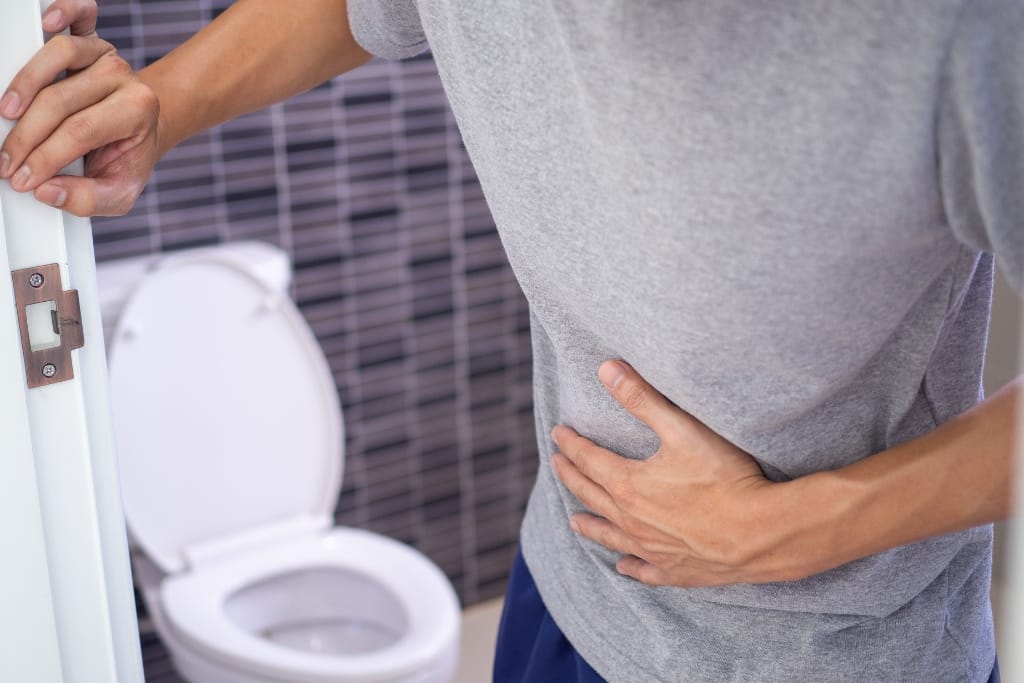Traveling to new and exciting destinations is one of life's greatest pleasures. The thrill of exploring unfamiliar places, immersing oneself in different cultures, and savoring local cuisines is unparalleled.
Yet, nothing can derail your adventures quicker than a bout of traveler's diarrhea.
This common affliction, impacting millions of globe-trotters every year, can quickly turn a dream vacation into a nightmare.
However, with the right precautions and a bit of foresight, you can safeguard your health and avert this unpleasant scenario.
Understanding the causes and implementing practical measures can empower you to navigate through culinary experiences and travel itineraries with confidence.
Whether you're a seasoned traveler or embarking on your first big trip, equipping yourself with these essential tips will help ensure that you're not sidelined by gastrointestinal woes, allowing you to make the most of your journeys and create lasting memories.
1)) Watch What You Eat
One of the most common causes of traveler's diarrhea is consuming contaminated food or water.
To avoid this, stick to bottled water and avoid ice cubes in drinks.
Be cautious about eating raw fruits and vegetables that may have been washed in tap water, and opt for cooked foods instead.
Tips for Safe Eating While Traveling:
- Stick to Bottled Water: Always drink bottled water and ensure the seal is intact before consuming. This will help you avoid any potential contaminants present in local tap water.
- Avoid Ice Cubes: Skip ice in your drinks since ice can be made from unpurified water, posing a risk of ingesting harmful bacteria or viruses.
- Opt for Cooked Foods: Prioritize eating well-cooked foods over raw fruits and vegetables, as high temperatures during cooking can kill most pathogens that cause traveler's diarrhea.
By being mindful of what you consume while traveling, you can significantly reduce the risk of encountering the unpleasant effects of traveler's diarrhea.
Sticking to bottled water, avoiding ice cubes, and opting for cooked foods can help ensure that your culinary adventures remain delightful and that you stay healthy throughout your trip.
With these precautions in place, you can focus on fully enjoying your travel experiences and the rich flavors each destination has to offer.
2)) Practice Good Hygiene
Proper handwashing is crucial in preventing the spread of bacteria that can cause traveler's diarrhea.
Always wash your hands before eating or preparing food, after using the bathroom, and after touching surfaces in public places.
Tips for Practicing Good Hygiene While Traveling:
- Wash Hands Regularly: Make it a habit to wash your hands frequently with soap and water, especially before eating, after using the bathroom, and when returning from public places. This simple step can minimize the risk of bacterial transmission.
- Carry Hand Sanitizer: When soap and water are not available, use an alcohol-based hand sanitizer. Opt for a sanitizer with at least 60% alcohol content to effectively kill germs.
- Avoid Touching Your Face: Minimize touching your eyes, nose, and mouth with unwashed hands, as these are common entry points for bacteria and viruses that can lead to infections.
By maintaining high standards of hygiene during your travels, you can greatly decrease the likelihood of falling ill.
Regular handwashing, carrying hand sanitizer, and avoiding touching your face are simple yet effective practices that can protect you from harmful bacteria and viruses.
These precautions enable you to fully immerse yourself in your travel activities, knowing that you're safeguarding your health along the way.
3)) Pack Medications
It's always a good idea to pack some over-the-counter medications like anti-diarrheal pills or electrolyte solutions in case you do come down with traveler's diarrhea.
These can help alleviate symptoms and keep you comfortable until you can seek medical attention if necessary.
Tips for Packing Medications While Traveling:
- Bring Anti-Diarrheal Medication: Carry over-the-counter anti-diarrheal medications like loperamide. These can provide quick relief from symptoms and help you manage your condition until you reach medical help if needed.
- Include Electrolyte Solutions: Pack oral rehydration salts or electrolyte solutions to prevent dehydration if you experience severe diarrhea. These are crucial in replenishing lost fluids and maintaining electrolyte balance.
- Consult Your Doctor: Before traveling, talk to your healthcare provider about any prescription medications you might need, especially if you're prone to gastrointestinal issues. Having the right medications on hand can make a significant difference in managing potential health concerns.
By packing essential medications, you can be prepared for unforeseen health issues while traveling.
Having anti-diarrheal medication, and electrolyte solutions, and consulting your doctor ahead of time ensures you are ready to handle any digestive discomfort.
This readiness allows you to travel with greater peace of mind, knowing you have the tools to manage your health effectively if the need arises.
4)) Avoid Street Food
While trying local cuisine is one of the best parts of traveling, it's important to be cautious when it comes to street food vendors.
Their hygiene practices may not be up to par, increasing your risk of contracting traveler's diarrhea.
Tips for Avoiding Street Food While Traveling:
- Dine at Established Restaurants: Choose to eat at well-known and reputable restaurants as they are more likely to adhere to proper hygiene standards and food safety practices compared to some street vendors.
- Research Local Recommendations: Look up reviews and recommendations from other travelers and locals. Trusted sources can guide you to safe food options where hygiene practices are reliable.
- Observe Food Handling Practices: If you decide to eat street food, pay attention to how the food is handled, prepared, and stored. Ensure that the vendor uses clean utensils, wears gloves, and cooks food thoroughly to minimize the risk of contamination.
Being selective about where you eat can greatly reduce the risk of traveler's diarrhea.
Opting for established restaurants, researching local recommendations, and being observant of food handling practices are crucial steps in safeguarding your health.
This mindful approach allows you to experience local flavors without compromising on safety, ensuring that your culinary adventures are both enjoyable and trouble-free.
5)) Stay Hydrated
Dehydration is a common side effect of traveler's diarrhea, so it's important to drink plenty of fluids if you do come down with it.
Stick to bottled water or other safe beverages to ensure you are staying hydrated.
Tips for Staying Hydrated While Traveling:
- Drink Bottled Water: Always opt for bottled water to avoid any potential contaminants that could exacerbate dehydration or cause further illness. Ensure the seal is intact before drinking.
- Consume Hydrating Beverages: In addition to water, drink beverages like herbal teas, coconut water, and oral rehydration solutions that can help maintain electrolyte balance and keep you well-hydrated.
- Eat Water-Rich Foods: Incorporate fruits and vegetables with high water content, such as cucumbers, watermelons, and oranges, into your diet. These can help supplement your fluid intake and provide essential nutrients.
Staying adequately hydrated is crucial when dealing with traveler's diarrhea.
Drinking bottled water, consuming hydrating beverages, and incorporating water-rich foods into your diet are effective strategies to maintain hydration and avoid further complications.
Prioritizing your hydration ensures that your body can recover more quickly and allows you to continue enjoying your travels in comfort.
6)) Be Cautious With Alcohol
Alcohol can exacerbate gastrointestinal issues, so it's best to limit your intake if you are trying to prevent traveler's diarrhea.
Stick to small amounts and opt for safer options like beer or wine over mixed drinks.
Tips for Being Cautious With Alcohol While Traveling:
- Limit Alcohol Intake: Keep your consumption to a minimum to avoid irritating your gastrointestinal system. Drinking in moderation helps prevent alcohol-induced dehydration and any potential exacerbation of symptoms.
- Opt for Beer or Wine: Choose safer alcoholic beverages like beer or wine instead of mixed drinks, which may contain dubious ingredients or ice made from unsafe water. This can lower the risk of consuming contaminated substances.
- Alternate With Water: For every alcoholic beverage, drink a glass of water. This practice helps maintain your hydration levels and mitigates the dehydrating effects of alcohol.
Being mindful of your alcohol consumption is key to avoiding further gastrointestinal distress while traveling.
Limiting your intake, choosing safer options like beer or wine, and alternating with water can help mitigate the negative effects of alcohol.
These precautions enable you to enjoy social activities without compromising your health, contributing to a safer and more enjoyable travel experience.
7)) Choose Restaurants Wisely
When dining out while traveling, choose restaurants that look clean and reputable.
Avoid places that appear dirty or unkempt, as they may not follow proper food safety protocols.
Tips for Choosing Restaurants Wisely While Traveling:
- Inspect Cleanliness: Before deciding to dine at a restaurant, take a moment to observe its cleanliness. A tidy dining area and well-maintained facilities are good indicators that the establishment follows proper hygiene standards.
- Check Online Reviews: Utilize resources like travel blogs, review websites, and social media to check ratings and read reviews from other travelers. Positive feedback and high ratings often reflect the reliability and hygiene of the restaurant.
- Look for Local Crowds: A busy restaurant frequented by locals is usually a good sign of quality and safety. Local patrons tend to dine at places that consistently offer good food and maintain high standards of cleanliness.
Choosing the right restaurants while traveling plays a significant role in preventing traveler's diarrhea.
By inspecting cleanliness, checking online reviews, and dining where the locals do, you can greatly reduce the risk of eating at unhygienic establishments.
These practices ensure that you can enjoy your meals with peace of mind, making your travel experience both safe and pleasurable.
8)) Get Plenty Of Rest
Traveling can be exhausting, which can weaken your immune system and make you more susceptible to illnesses like traveler's diarrhea.
Make sure to get plenty of rest during your trip to keep your body strong and healthy.
Tips for Getting Plenty Of Rest While Traveling:
- Prioritize Sleep: Aim to get 7-9 hours of sleep each night. Stick to a regular sleep schedule as much as possible, even when crossing time zones, to help your body adjust and recover.
- Take Short Naps: If you feel fatigued during the day, take short naps of 20-30 minutes to recharge. Avoid longer naps as they can interfere with your nighttime sleep.
- Create a Relaxing Environment: Make your sleeping environment comfortable by using earplugs, an eye mask, or a white noise machine to block out disturbances. Consider bringing a travel pillow and blanket to enhance your comfort.
Getting plenty of rest is essential for maintaining your overall health and preventing traveler's diarrhea.
By prioritizing sleep, taking short naps during the day, and creating a relaxing sleeping environment, you can keep your immune system robust and ready to fend off illnesses.
Ensuring adequate rest helps you stay energized and enjoy your travels to the fullest.
9)) Listen To Your Body
If something doesn't feel right while traveling, don't ignore it! Pay attention to any changes in your bowel movements or stomach discomfort and seek medical attention if necessary.
Tips for Listening to Your Body While Traveling:
- Pay Attention to Symptoms: Monitor any signs of gastrointestinal distress, such as stomach pain, cramps, or changes in bowel movements. Early recognition can help you take prompt action to manage symptoms before they worsen.
- Take Breaks When Needed: If you feel fatigued or notice signs of dehydration, permit yourself to take a break and rest. Overexertion can weaken your immune system, making it harder for your body to recover.
- Seek Medical Advice: Do not hesitate to seek medical attention if your symptoms persist or worsen. Consulting a healthcare professional can help you get the necessary treatment and prevent minor issues from turning into more serious health concerns.
Listening to your body while traveling is crucial for preventing and managing any potential health issues.
By paying attention to symptoms, taking breaks when necessary, and seeking medical advice when needed, you can address any problems early and maintain your well-being on the road.
This proactive approach ensures you stay healthy and can fully enjoy your travel adventures.
Pro-Tip: Consider taking melatonin supplements to help regulate your sleep cycle, especially when crossing time zones. Melatonin can be beneficial in adjusting your internal clock, making it easier to get restful sleep and stay refreshed during your travels. Make sure to follow the recommended dosage and consult with your healthcare provider before starting any new supplement. Stay well-rested and make the most of your journey by incorporating melatonin into your travel routine!
10)) Plan Ahead
Before embarking on your trip, do some research on the destination you will be visiting in terms of food safety and health risks.
Knowing what potential hazards exist will help you better prepare for them and reduce your chances of getting sick.
Tips for Planning While Traveling:
- Research Local Conditions: Before your trip, investigate the food safety standards, common health concerns, and available medical facilities in your destination. Understanding the local environment can help you take appropriate precautions.
- Pack Essential Health Supplies: Bring along a travel health kit that includes items like hand sanitizers, over-the-counter medications for gastrointestinal issues, rehydration salts, and any prescription medicines you may need. This ensures you are prepared to handle minor health issues without delay.
- Get Vaccinated and Insured: Make sure you are up-to-date on any required or recommended vaccinations for your destination. Obtain comprehensive travel insurance that covers health emergencies, so you can receive medical care if needed without worrying about costs.
Planning is key to ensuring a safe and enjoyable travel experience. By researching local conditions, packing essential health supplies, and staying up-to-date on vaccinations and insurance, you can proactively manage potential health risks.
This preparation helps minimize the likelihood of illness, allowing you to focus on making the most of your trip.
Conclusion
Preventing traveler's diarrhea might seem daunting, but with a little preparation and vigilance, you can significantly reduce the risk and enjoy your travels to the fullest.
By carefully selecting what you eat and drink, maintaining good hygiene, and being smart about your food choices, you protect yourself from this common travel woe.
Packing essential medications, staying adequately hydrated, and limiting alcohol intake are also key strategies to keep you healthy.
Additionally, making wise dining choices, ensuring you get enough rest, and listening to your body’s signals can make a world of difference.
Most importantly, planning and being informed about your destination's specific food safety practices and potential health risks will arm you with the knowledge to navigate your trip confidently.
Remember, the goal of traveling is to create wonderful memories and immerse yourself in new experiences, not to be sidelined by preventable health issues.
Armed with these ten comprehensive tips, you are well-prepared to guard against traveler's diarrhea and ensure that your adventures remain both enjoyable and memorable.
Safe travels and may your journeys be filled with nothing but joy and discovery!
Related Articles and Guides
- How To Get Rid Of Traveler's Diarrhea
- How To Avoid Traveler's Diarrhea
- How To Treat Traveler's Diarrhea Naturally
Download Our Free E-book!







